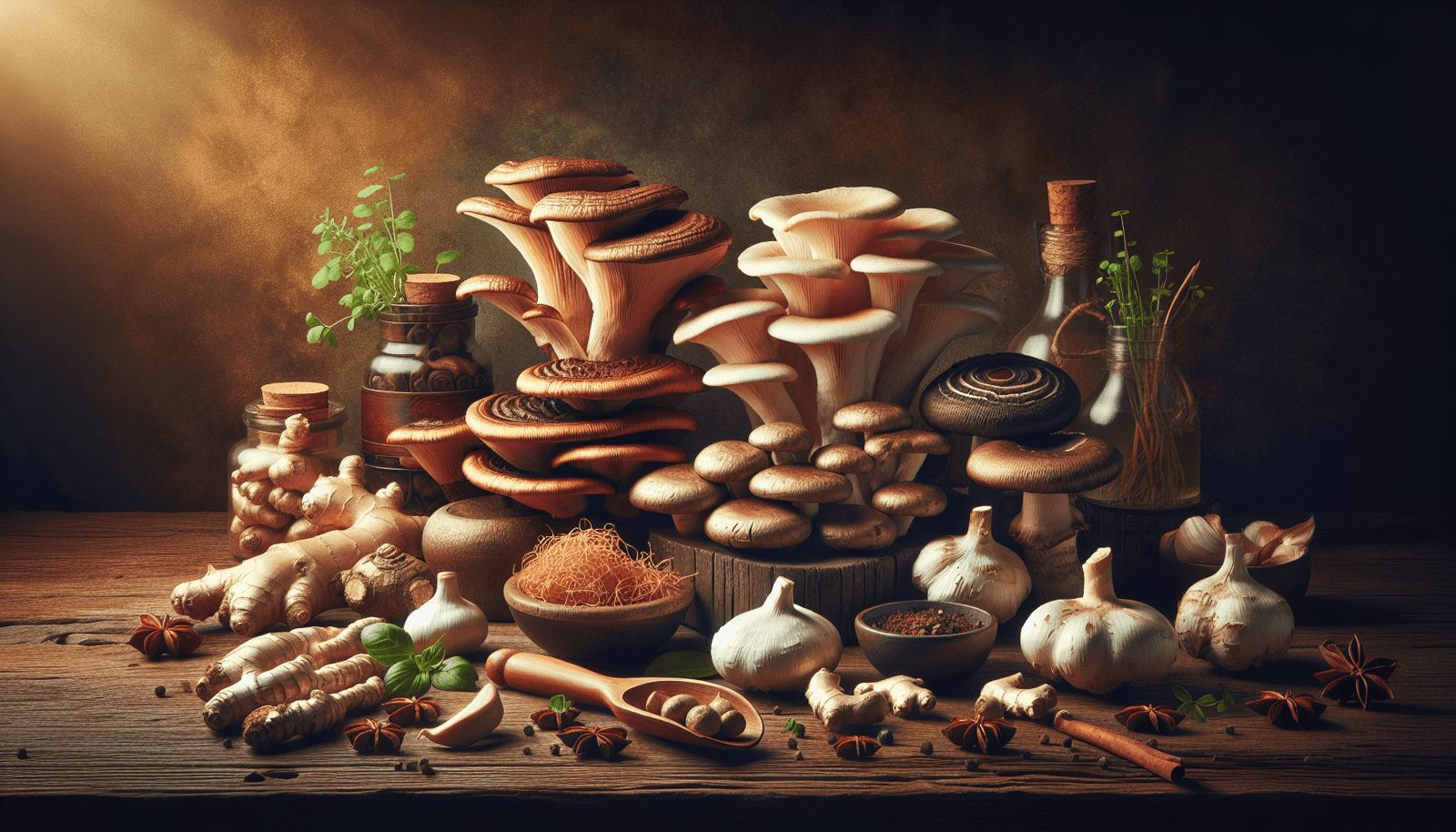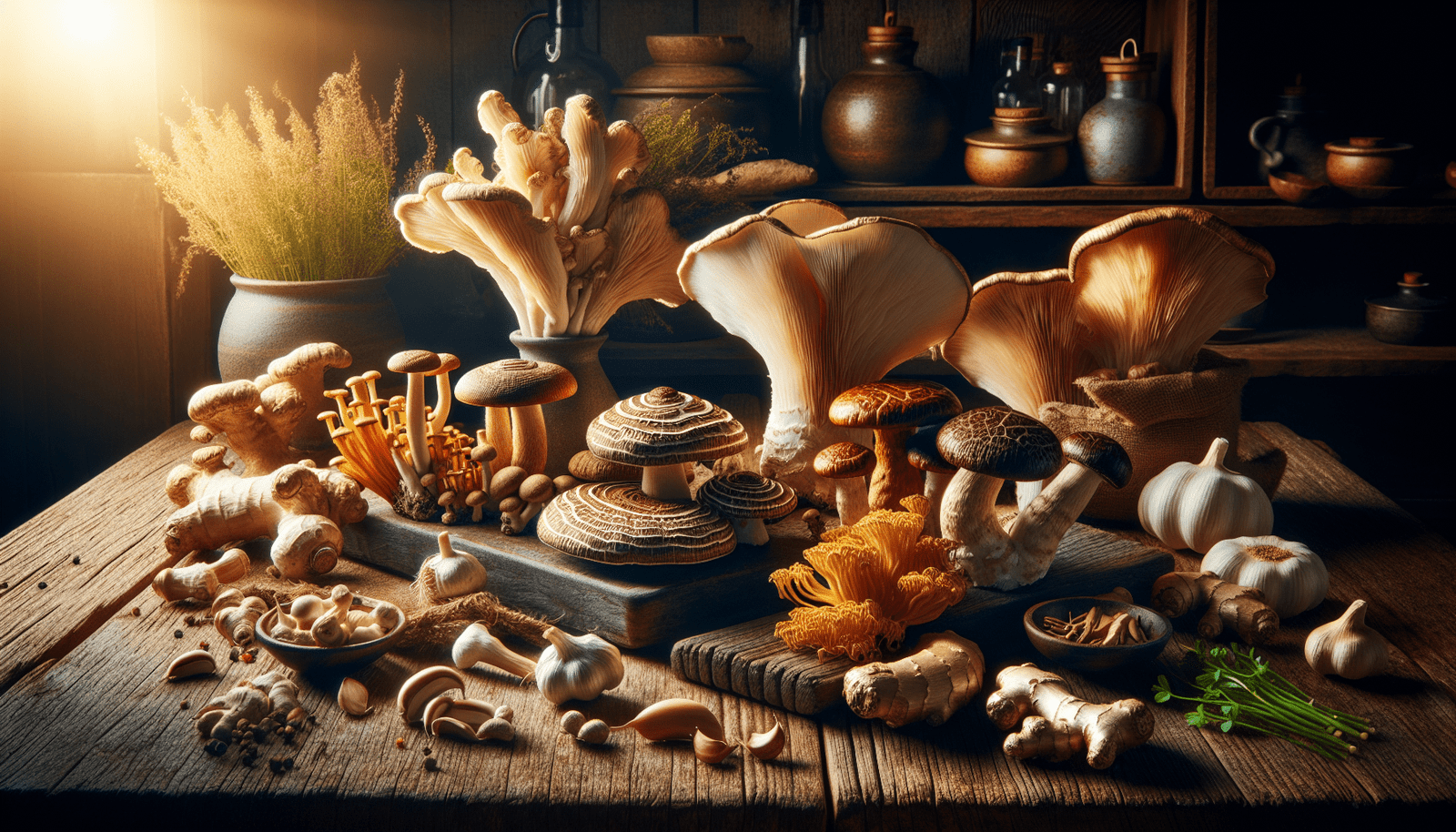Have you ever wondered how to elevate your culinary game while also boosting your health? Medicinal mushrooms might just be the secret ingredient you’re looking for. These incredible fungi aren’t merely culinary delights; they are nutritional powerhouses with therapeutic properties, perfect for anyone keen on delicious and healthy eating.

Understanding Medicinal Mushrooms
Medicinal mushrooms are a category of fungi known not just for their culinary uses but also for their health benefits. They have been used in traditional medicine for centuries, and modern science is starting to validate many of their purported health benefits.
Types of Medicinal Mushrooms and Their Benefits
Here’s a quick overview of some commonly used medicinal mushrooms and the health benefits they can offer:
| Mushroom Type | Health Benefits |
|---|---|
| Reishi | Boosts immune system, reduces stress, promotes sleep quality |
| Chaga | High in antioxidants, supports immune health, reduces inflammation |
| Cordyceps | Increases energy, improves athletic performance, supports respiratory health |
| Lion’s Mane | Enhances cognitive function, promotes nervous system health, reduces anxiety |
| Turkey Tail | Supports the immune system, rich in antioxidants, promotes gut health |
These mushrooms can serve as both delectable ingredients in your dishes and as nutritional supplements to enhance your health.
Cooking with Medicinal Mushrooms
Cooking with medicinal mushrooms can be incredibly rewarding. Their unique flavors and textures can bring depth to your dishes, and their health benefits add an extra layer of nutritional value.
Selecting Medicinal Mushrooms
When choosing medicinal mushrooms, freshness is key. Look for mushrooms that are firm, free of blemishes, and ideally organic to avoid any harmful pesticides.
Preparation and Cleaning
Before cooking, it’s essential to clean the mushrooms properly. Use a damp cloth or a soft brush to remove any dirt. Avoid washing them under running water as mushrooms tend to absorb water, which can affect their texture and flavor.
Tasty and Therapeutic Recipes
Let’s dive into some mouth-watering recipes that incorporate these beneficial fungi.
Reishi Mushroom Tea
Reishi mushroom tea is a fantastic way to incorporate the health benefits of this mushroom without spending much time in the kitchen.
Ingredients:
- 1 ounce dried Reishi mushrooms
- 4 cups of water
- Honey or lemon (optional)
Instructions:
- Break the Reishi mushrooms into smaller pieces.
- Boil the mushrooms in water for about 1-2 hours until the water turns a deep amber color.
- Strain the liquid into a cup.
- Sweeten with honey or lemon to taste.
This tea not only helps in relaxing and reducing stress but can also be a soothing bedtime beverage.
Chaga Mushroom Smoothie
Infusing your smoothie with Chaga mushrooms can turn your morning meal into a health-boosting tonic.
Ingredients:
- 1 cup almond milk
- 1 frozen banana
- 1 tablespoon Chaga mushroom powder
- 1 tablespoon almond butter
- 1 teaspoon honey
Instructions:
- Combine all ingredients in a blender.
- Blend until smooth.
- Pour into a glass and enjoy.
Chaga helps to charge your body with antioxidants while keeping inflammation at bay.
Cordyceps Stir-Fry
Adding Cordyceps to a savory stir-fry can improve your energy levels and enhance your respiratory health.
Ingredients:
- 2 cups mixed vegetables (bell peppers, broccoli, carrots)
- 1 cup fresh cordyceps mushrooms
- 2 tablespoons soy sauce
- 1 tablespoon olive oil
- 1 clove garlic, minced
- 1 teaspoon ginger, grated
Instructions:
- Heat olive oil in a pan over medium heat.
- Add garlic and ginger and sauté for 1 minute.
- Add the cordyceps mushrooms and mixed vegetables.
- Stir-fry for about 5-7 minutes, until vegetables are tender.
- Add soy sauce and cook for another 1-2 minutes.
- Serve hot.
This stir-fry is not just delicious but also energizing and nourishing.
Lion’s Mane Mushroom Crab Cakes
Lion’s mane mushrooms have a seafood-like texture that makes them an excellent vegetarian alternative to crab cakes.
Ingredients:
- 2 cups Lion’s Mane mushrooms, shredded
- 1/2 cup bread crumbs
- 1 egg, beaten
- 1/4 cup mayonnaise
- 1 tablespoon Dijon mustard
- 1 teaspoon Old Bay seasoning
- 2 tablespoons olive oil
Instructions:
- In a bowl, mix the shredded mushrooms, bread crumbs, egg, mayonnaise, mustard, and seasoning.
- Form the mixture into small patties.
- Heat olive oil in a pan over medium heat.
- Cook the patties for about 3-4 minutes on each side until golden brown.
- Serve hot with a side of salad or sauce of your choice.
These crab cakes are not only tasty but also promote cognition and nervous system health.
Turkey Tail Mushroom Soup
A warm bowl of turkey tail mushroom soup is perfect for boosting your immune system, especially during colder months.
Ingredients:
- 2 cups turkey tail mushrooms, chopped
- 4 cups vegetable broth
- 1 onion, chopped
- 2 cloves garlic, minced
- 1 teaspoon thyme
- Salt and pepper to taste
- 2 tablespoons olive oil
- 1 cup chopped carrots
- 1 cup chopped celery
Instructions:
- Heat olive oil in a large pot over medium heat.
- Add onion, garlic, carrots, and celery. Sauté until tender.
- Add turkey tail mushrooms and thyme. Cook for another 5 minutes.
- Pour in the vegetable broth.
- Season with salt and pepper.
- Simmer for 20-30 minutes.
- Serve hot.
This soup is a delicious way to enjoy the immune-boosting benefits of turkey tail mushrooms.
Enhancing Your Culinary Skills with Mushroom Cooking Techniques
When cooking with any type of mushroom, there are specific techniques to keep in mind to bring out their best flavors.
Enhancing Umami Flavor
Mushrooms are renowned for their umami flavor. To amplify this, consider the following methods:
- Roasting: Place mushrooms on a baking tray, drizzle with olive oil, and roast at 375°F until golden and crispy.
- Sauteing: Cook mushrooms in a hot pan with a small amount of oil to concentrate their flavors.
- Blanching: Briefly boiling mushrooms before adding them to dishes can enhance their texture and flavor.
Preservation Tips
To enjoy mushrooms year-round, consider these preservation methods:
- Drying: Dehydrate mushrooms using a dehydrator or an oven set to a low temperature.
- Pickling: Pickle mushrooms in a mixture of vinegar, water, and your favorite spices.
- Freezing: Sauté mushrooms before freezing to maintain their texture and flavor.

Culinary Creativity: Beyond Standard Dishes
Don’t limit yourself to conventional cooking. Mushrooms can be a fantastic ingredient in unexpected recipes.
Mushroom Desserts
Mushrooms in desserts? Yes, it’s entirely possible and delicious!
- Chaga Mushroom Chocolate Truffles: These rich and flavorful truffles combine cacao and Chaga powder for a decadent treat.
- Reishi Mushroom Honey Cakes: Infuse your honey cakes with Reishi for a unique twist that offers stress relief.
Mushroom Smoothies and Juices
Add a health-packed punch to your morning routine.
- Reishi and Cacao Smoothie: A blend of Reishi powder, bananas, and cacao for a chocolatey, calming beverage.
- Lion’s Mane Green Juice: Mix Lion’s Mane powder with spinach, apple, and cucumber for a brain-boosting drink.
Health and Nutrition of Medicinal Mushrooms
Beyond their culinary appeal, medicinal mushrooms provide numerous health benefits. Here’s a deep dive into the nutritional advantages:
Immune Support
Many medicinal mushrooms like Reishi and Turkey Tail are recognized for their immune-boosting properties due to their high antioxidant content and beta-glucans.
Cognitive Function
Lion’s Mane has been studied for its potential to enhance cognitive function, reduce anxiety, and promote the health of the nervous system.
Energy and Performance
Cordyceps are known to increase energy levels, enhance athletic performance, and support respiratory health, making them popular among athletes.
Digestive Health
Turkey Tail mushrooms are known to promote gut health by acting as a prebiotic, which supports a healthy microbiota in your digestive system.
Antioxidant Properties
Chaga mushrooms are packed with antioxidants that help neutralize harmful free radicals in the body, thus reducing inflammation and potentially lowering the risk of certain diseases.
Sustainability and Foraging
Being sustainable in your food choices can lead you to the wonderful world of foraging and even home-growing your own mushrooms.
Ethical Practices in Foraging
When foraging for mushrooms, it’s important to follow ethical practices:
- Respect Nature: Only take what you need to avoid disrupting the ecological balance.
- Use of Sustainable Methods: Avoid using tools that can damage the environment.
- Know Your Mushrooms: Make sure to correctly identify mushrooms to avoid picking toxic varieties.
Cultivating Your Own Mushrooms
Growing your own medicinal mushrooms can be a fulfilling and sustainable practice. Here are some steps to get started:
- Choose Your Mushroom Type: Consider which medicinal mushrooms you’d like to grow (e.g., Reishi, Lion’s Mane).
- Substrate Preparation: Most mushrooms grow well on specific substrates like sawdust or straw. Follow the recommended preparation steps for the type of mushroom.
- Inoculation: Introduce mushroom spores or spawn into the substrate.
- Incubation: Keep your growing medium in a dark, humid place until the mycelium has colonized the substrate.
- Fruiting: Move your substrate to a location with the right light and humidity to encourage mushroom fruiting.
Interactive Community Engagement
Cooking and consuming mushrooms can be even more enjoyable when you share your experiences and learn from others.
Sharing Recipes and Tips
Consider joining online communities or local groups of mushroom enthusiasts. Share your recipes, cooking tips, and even the joys of your foraging and growing experiences.
Collective Foraging Trips
Organize or join foraging walks with knowledgeable guides. These outings can help you learn more about identifying and collecting wild mushrooms ethically and safely.
Cooking Classes and Workshops
Participate in mushroom-focused cooking classes and workshops to expand your culinary skills and knowledge about various mushroom varieties.
Conclusion
Medicinal mushrooms are truly a fascinating addition to any kitchen. Not only do they offer a depth of flavors and textures that can elevate your dishes, but they also provide a myriad of health benefits. From the rich umami taste to the boost in immunity and cognitive function, medicinal mushrooms are a formidable ally in both your culinary and health journeys.
By understanding the types, benefits, and preparation techniques of medicinal mushrooms, you can incorporate these versatile ingredients in creative and delicious ways. Whether it’s a comforting bowl of soup, a rejuvenating smoothie, or even an adventurous dessert, medicinal mushrooms have the potential to enrich your diet and enhance your well-being.
So next time you’re planning a meal, consider adding a touch of these fantastic fungi. Your taste buds and your health will thank you.
